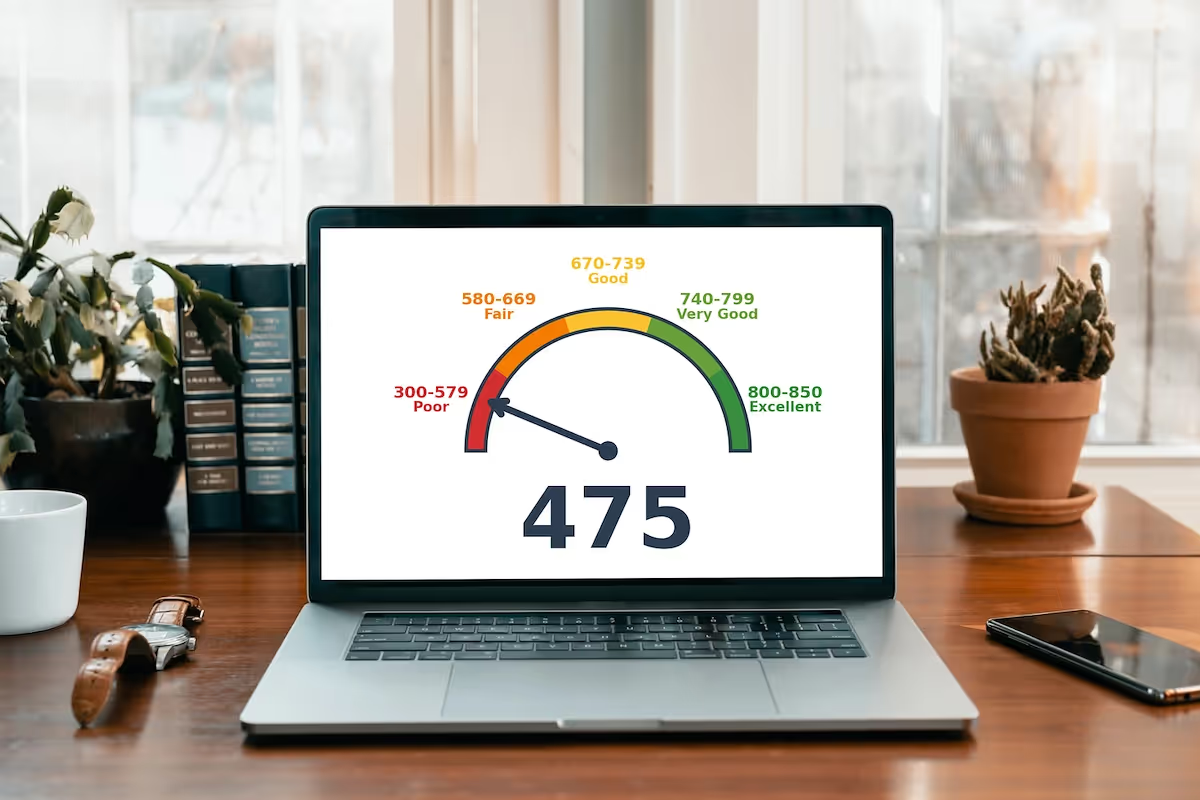
Kudos has partnered with CardRatings and Red Ventures for our coverage of credit card products. Kudos, CardRatings, and Red Ventures may receive a commission from card issuers. Kudos may receive commission from card issuers. Some of the card offers that appear on Kudos are from advertisers and may impact how and where card products appear on the site. Kudos tries to include as many card companies and offers as we are aware of, including offers from issuers that don't pay us, but we may not cover all card companies or all available card offers. You don't have to use our links, but we're grateful when you do!
475 Credit score: What You Need to Know in 2025
July 1, 2025


TL;DR
A 475 credit score is a foundational starting point from which you can build a much stronger credit profile. According to the FICO model, this score is in the "Poor" category, highlighting clear opportunities for growth.
What Does a 475 Credit Score Mean?
A credit score of 475 falls into the "poor" range of the FICO scoring model (300-850). Lenders view this score as high-risk, making it very difficult to qualify for new credit. If you are approved for a loan or credit card, expect steep interest rates and unfavorable terms. This makes borrowing significantly more expensive and limits your financial options.
While a 475 score creates immediate challenges, it isn't permanent. This number reflects past credit history, but it doesn't have to define your financial future. Understanding the factors behind your score is the first step toward improvement. Over time, it is possible to build a stronger credit profile and gain access to better financial opportunities.
Who Has a 475 Credit Score?
While age itself isn't a factor in credit scoring, average scores tend to rise with each generation. This is often because older individuals have had more time to build a positive payment history and establish a longer credit track record. Based on 2023 data, here is the average FICO score by age group:
- Generation Z (ages 18-26): 680
- Millennials (ages 27-42): 690
- Generation X (ages 43-58): 709
- Baby Boomers (ages 59-77): 745
- Silent Generation (ages 78+): 760
Credit Cards With a 475 Credit Score
A credit score of 475 falls into the "poor" credit range, which can significantly limit your options when applying for a new credit card. Most mainstream lenders view this score as high-risk, making it challenging to get approved for traditional unsecured cards with favorable terms. You'll likely find your choices are restricted to secured credit cards or specific unsecured cards designed for bad credit, which often come with higher interest rates and fees.
Kudos offers AI-powered tools like the Explore Tool and Dream Wallet that analyze your financial situation by asking about your goals or assessing your actual spending habits. These tools provide personalized recommendations from a database of nearly 3,000 cards and offer insights into how a new card might impact your credit score.
Auto Loans and a 475 Credit Score
A 475 credit score places you in the deep subprime category, which can significantly impact your ability to secure an auto loan. According to a 2025 analysis, while approval is still possible, you should expect to face some of the highest interest rates and strictest lending terms available.
- Super-prime (781-850): 5.25% for new cars and 7.13% for used cars
- Prime (661-780): 6.87% for new cars and 9.36% for used cars
- Non-prime (601-660): 9.83% for new cars and 13.92% for used cars
- Subprime (501-600): 13.18% for new cars and 18.86% for used cars
- Deep subprime (300-500): 15.77% for new cars and 21.55% for used cars
Mortgages at a 475 Credit Score
With a 475 credit score, your mortgage options are extremely limited. Most conventional, VA, and USDA loans are unavailable, as their minimum credit requirements are typically 620 or higher. Your main path would be an FHA loan, which accepts scores as low as 500, but you will be required to make a down payment of at least 10%. While some specialty subprime lenders may consider your application, these are rare.
If you do manage to qualify for a loan, expect less favorable terms. A 475 score will result in significantly higher interest rates and fees. Lenders will also subject you to a more rigorous manual underwriting process, scrutinizing your entire financial profile to offset the risk associated with a low credit score.
What's in a Credit Score?
Figuring out what goes into your credit score can feel like trying to solve a complex puzzle, but it generally boils down to a handful of key elements. The most common factors include:
- Your payment history, which tracks whether you pay your bills on time, is the most significant factor.
- Credit utilization, or the amount of credit you're using compared to your total available credit, also plays a major role.
- The length of your credit history demonstrates your experience with managing credit over time.
- Having a healthy mix of different types of credit, such as credit cards and installment loans, can positively impact your score.
- Finally, recent credit inquiries, which occur when you apply for new credit, are also taken into account.
How to Improve Your 475 Credit Score
No matter your starting point, improving your credit score is an achievable goal that can significantly impact your financial future. There are proven methods to boost your creditworthiness and build a healthier financial profile.
- Monitor your credit reports regularly. Checking your reports allows you to spot and dispute inaccuracies or fraudulent activity that could be unfairly dragging down your score. This also helps you track your progress as you work to establish better credit habits.
- Establish automatic bill payments. Since payment history is the most significant factor in your credit score, automating payments ensures you never miss a due date. Consistently paying on time is a critical step to recovering from a poor score and preventing further damage.
- Reduce your credit utilization ratio. Lenders look at how much of your available credit you use, and paying down balances shows you can manage debt responsibly. Keeping your utilization low is a key part of rebuilding your credit profile.
- Apply for a secured credit card. For those with damaged credit, a secured card is an excellent tool for establishing a new, positive payment history. It is often easier to get approved for and allows you to demonstrate your creditworthiness over time.
A financial companion like Kudos can help you manage your cards and monitor your score as you work to improve it.
Unlock your extra benefits when you become a Kudos member

Turn your online shopping into even more rewards

Join over 400,000 members simplifying their finances

Editorial Disclosure: Opinions expressed here are those of Kudos alone, not those of any bank, credit card issuer, hotel, airline, or other entity. This content has not been reviewed, approved or otherwise endorsed by any of the entities included within the post.



































.webp)

.webp)
.webp)





